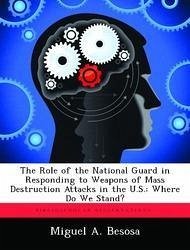The potential for terrorists' use of weapons of mass destruction (WMD) threatens Americans every day. To many nations and groups, their only means to counter the United States (U.S.) is with nuclear, biological, or chemical weapons. According to most experts, terrorists' use of WMD is no longer a question of "if" they will be used, but "when." When domestic capabilities were found to be lacking in this regard, Congress enacted legislation, Public Law 104-201, and named the National Guard as the primary responder to domestic WMD events. It is evident gaps and shortfalls remain in the National Guard`s (NG) ability to respond to domestic WMD attacks. The purpose of this paper is to examine the critical gaps and shortfalls encountered by the CSTs since their activation. This is done by investigating any available materials concerning the NG involvement in the program, identifying the critical gaps and shortfalls encountered by the CSTs, and to coming up with recommendations to correct them.
Hinweis: Dieser Artikel kann nur an eine deutsche Lieferadresse ausgeliefert werden.
Hinweis: Dieser Artikel kann nur an eine deutsche Lieferadresse ausgeliefert werden.








